One Gazan’s war diary, November 14-21.
By Ahmed G. Ferwana
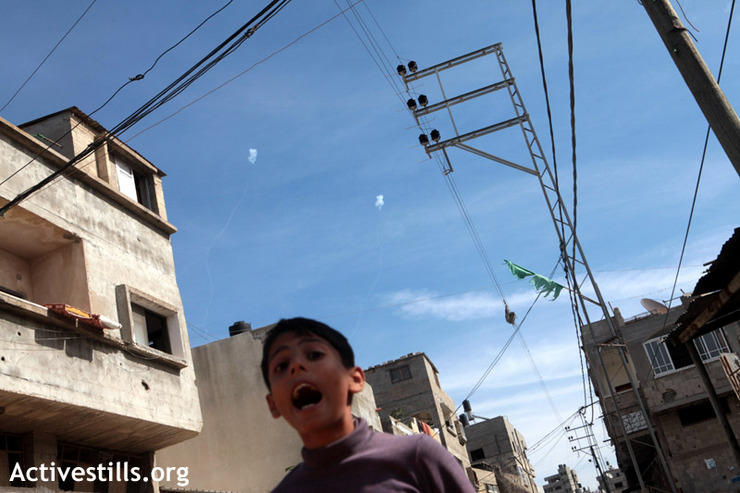
November 14
I wished my colleagues and students a nice weekend, and left the American International School of Gaza (AISG), where I work as a Language and Literature teacher, for my apartment on Al-Shuhada Street, which I consider to be one of the most beautiful streets in the Gaza Strip. It was a lovely Wednesday, to be followed by a three-day vacation, and I had plans to meet some friends for a barbeque. Then, time and date was all that mattered once I had that moment of silence as a response to the noises in the street; the waves of an unknown instability. I looked out the window of my room, wondering about the ambulance sirens and the fire trucks to see nothing but rushing journalists coming out of a nearby building. That site prompted me to search local news sites to investigate what was happening. After a few minutes of searching, the mystery was resolved.
At 4:00 p.m. the Israeli military assassinated Ahmed Al Jabari, the leader of the Hamas armed wing. This would spark the period of instability that lay ahead, and I could do nothing but humbly lay down my body, paralyzed with fear, and unintentionally fell into a deep sleep.
I woke up hours later to a phone call from my mother, her voice weakened by worry and anxiety, begging me to leave the apartment in Gaza City and head to Rafah to be with the family through the hardship that was fully anticipated. I couldn’t convince her that the first thing I would be do is head to Rafah, a city bordering Egypt with hundreds of tunnels that would be targeted by Israeli warplanes. I spent that night knowing that the trip to Rafah from Gaza City would not be an easy one. In fact, traveling to Rafah at that time would be an attempt at evading death on a road shadowed by death, as “Pillar of Defense,” Israel’s latest military assault on the Gaza Strip, was getting underway.
But as I considered the route, I realized that the strategic planning and calculations of chances for survival were causing a deep internal change within me. All of a sudden, I transformed from a normal individual seeking a normal life, to an eager survivor seeking to survive a war. Despite being somewhere that would be slightly safer from Israeli airstrikes, I chose to be driven by the desire to be with my family in a house not far from the Egyptian border; less than half a mile from where the heavy Israeli airstrikes would target the tunnels. Walking through the empty streets of what had become a ghost city, I luckily found a taxi driver. I finally made it to my family’s house at around 2:00 p.m. on Thursday, November 15.
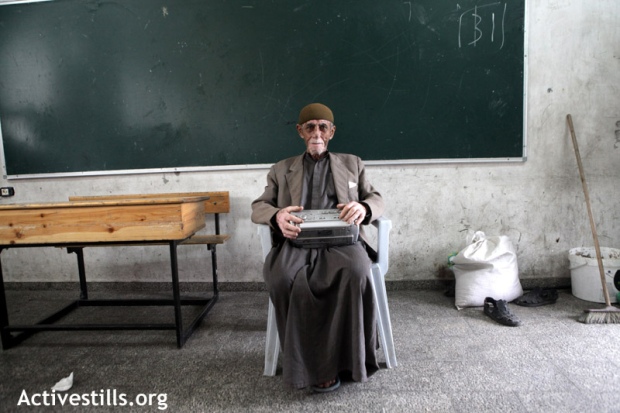
November 15
Victorious! Yes, victorious was how I felt when I saw the happy faces of my family members circling me and asking about the difficulties I might have faced on my way home. Victorious was how I felt when I was hugged through a chorus of thanks directed to the lord of the skies for bringing me home safely. The burst of joy was interrupted by a nearby explosion that shook the house for several seconds. My parents, four brothers, two sisters, three nephews and two nieces were all silenced for a moment; I killed the silence by announcing, “Gaza’s got talent! Even the house is belly dancing!” The whole family laughed at my silly comment, and the little nephews and nieces started jumping and laughing as I played with them.
By then, I felt far less victorious. How could I be victorious, knowing deep down the destructive power of war was right around the corner? How could I be victorious, knowing that the most I could do through this war is offer some reassuring words that might make my family feel less terrified or depressed? How could I be victorious, knowing I can’t protect myself or my family? How could I be victorious, knowing Gaza would turn into a pool of blood, and I would be nothing but a helpless bystander? My reflections were interrupted by my nephew, who approached me with his arms wide open, as though he were telling me, “I understand what you’re going through! Take it easy and hug it out!” My heart melted. I hugged back, until he started pushing me away because he needed to breathe.
What should I be? A worried Gazan who should think of his dear fellow Gazans, the war, the stress, the destruction, the exchange of rocket fire between Israel and Gaza, the material losses, the death toll, the innocent civilians, the airstrikes, and this madness on the whole? Or should I limit myself to being a member of a trembling family, who should think only of the safety of that family, safety I can’t provide except through poor, humble attempts at keeping everyone calm?
In December 2008, the Israeli army launched “Operation Cast Lead” against Gaza. I miraculously survived and managed to keep the family safe. In the process, I acquired a good amount of knowledge about the conflict and how to deal with it. This time, I opened all the windows and kept the doors ajar – in the last war, those windows and doors flew off the walls as a result of the pressure caused by the explosions from the airstrikes. I urged my family to clear out of the part of the house that is closest to the main street, so as to avoid flying bullets or shrapnel. I made sure to quell my brothers and sisters’ curious urge to leave the house or look out windows to examine what was happening, with warnings about what could happen. These precautions constructed what felt like an insecure balloon-like fortress; doing something – anything – brought me some relief.
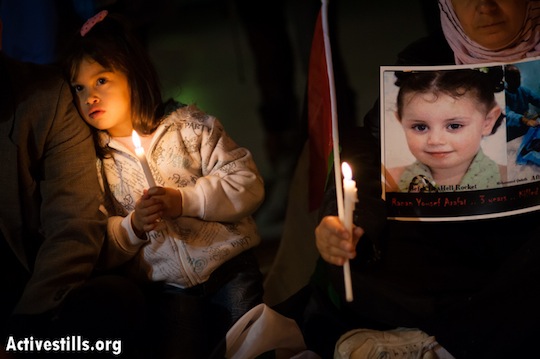
Night. November 15
The night was full of noises caused by surveillance drones swarming the dark skies. I tracked the airstrikes online, the numbers of unarmed civilians and children killed, and all the other losses in both Israel and Gaza. Numbers and numbers, all over the television and internet, in articles, commentary, reports – this was what mattered. That was what the people of Gaza were to the media; merely numbers, collateral damage in a war they never wished for. Parents who lost a child, children who lost a parent. It was all “collateral damage.” It felt like a moral conspiracy, to lessen the value of humanity, to avoid representing Gazans as human beings instead of numbers. This was a secondary “goal” in an unjust war: to dehumanize the innocents of Gaza.
Hours gone by with endless thinking; I checked on every family member, kissing each one as I hoped tomorrow would come and I would see everyone alive. The hours of darkness were accompanied by the sounds of bombardments from Israeli airstrikes and noises from the swarm of surveillance drones.
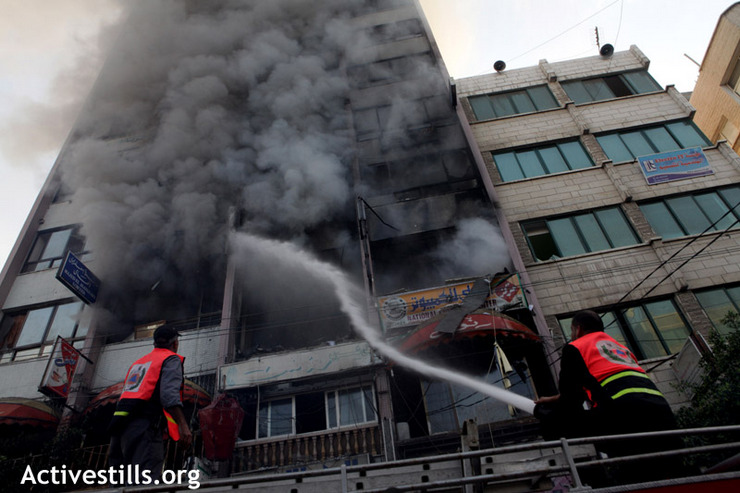
November 16
Friday. We woke up by massive airstrikes explosions all over Rafah. I carefully checked in on my family members, to comfort myself with their safety, and undertook a thorough scrutiny of the news on television and online, hoping the international community might have intervened and imposed a ceasefire, or any other decision to stop the nightmare of another unmerciful war. No such luck. Israel had announced a reinforcement of troops on the Gaza Strip border belt. The civilian death toll had risen. “What does that mean? Could it be preparation for a long-term war? Is Israel preparing for a ground invasion?” We were all asking questions that no one could answer.
I’m not a political analyst, nor have I ever wanted to be involved in politics. However, the subconscious system of my mind works in a way that I can’t control or understand at times of war. This system’s objective is survival. The complexities of war turn regular individuals into professional experts. I, like many other Gazans, can now differentiate by sound types of warplanes – Apache helicopters, F-16 fighter jets, or unmanned surveillance drones. I can measure the distance of airstrikes through the echo of the explosions or the intensity of a building’s belly dance. And if I’m outdoors, I can calculate the distance depending how high or how close the debris falls, and the amount of smoke visible from the explosion.
The most important rule: leaving your home could result in a meeting with the reaper. It’s true that the reaper occasionally pays house visits, but the chances of meeting him outside the home are much higher.
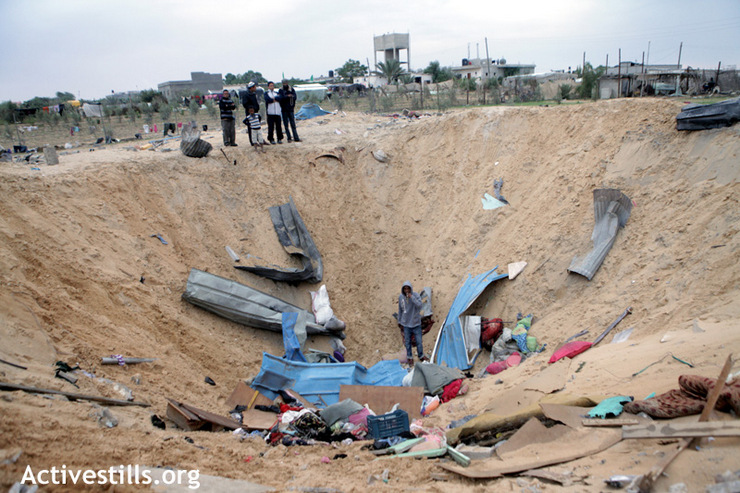
November 17, 4:00 a.m.
An explosion the likes of which I had never before experienced before in terms of sound, strength, and effect. I turned on all of the lights in the house, and as I headed back to my room, another rock-and-roll airstrike shook the house. Family members rushed out of their bedrooms. I took them all to what I call “the safe room,” which sits at the end of the house and right next to a neighboring building, thus protecting it from much of the damage. The family gathering has turned into an impromptu tea-time. We sat together, chitchatted, and exchanged fake smiles of security, as though 18 consecutive airstrikes weren’t targeting the tunnels less than half a mile away from the house and as though the whole neighborhood wasn’t being turned upside down.
Finally, my family went back to sleep, despite the noises of those drones in the sky. My thoughts traveled beyond the borders of Gaza, to southern Israel, specifically Be’er Sheva. I have two friends there, identified by most of the international community as “Israeli Palestinians,” and by Palestinians and other Arabs as “1948 Palestinians.” They were most likely somewhat affected by the war. Then I thought about other Israeli civilians and the pressure they were under at this time of hardship.
The Israeli government has all the technologies necessary for its army to surgically and accurately hit its military targets in Gaza, yet a lot of Gazans, including children, women, and elders, die on a daily basis because of the Israeli airstrikes. And Hamas – though it doesn’t have a fraction of Israel’s military might, or any tanks, warplanes, and warships – is firing primitive, homemade rockets on Israel in an act of defense, rockets that could be considered to be “fireworks” compared what a missile launched from an Israeli unmanned aircraft could cause, with few, albeit unbearable losses in Israel. Those rockets are fired in retaliation for the killing of innocent Gazans and the unjust life that Israel has brought not only on Hamas leaders, but also on the nearly two million civilians living in the Gaza Strip, through an economic siege in place since 2006. And Israel claims that the Israeli army, in an act of self-defense, fires rockets and launches military operations in Gaza to target the “terrorists” of Hamas. But is anyone who tries to defend Gaza any less of a “terrorist” according to the Israel dictionary? And what can us, Gazans, do? How can I help initiate an “agreement”? The current war was on its fifth consecutive day. So how dare I mention “negotiations?” How dare I mention a so-called “peace process” that has been deferred by ruthless wars and massacres since the 1948 Nakba? How dare I dream of stability with open eyes? How dare I claim “neutrality” and preach about the need for “coexistence?” Misapprehend this act of sacrifice that would likely be interpreted as an “act of naivety” or an “act of betrayal,” but my humble interpretation of that would be “a real call for peace;” “a real call of humanity.”
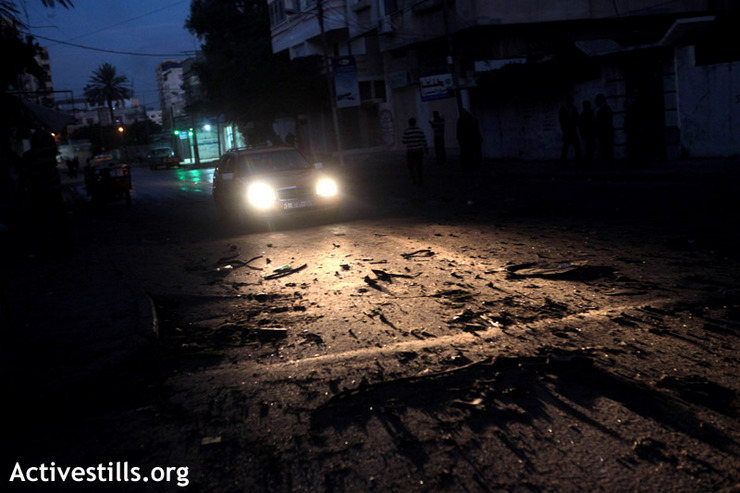
November 18
Melancholy creeps horribly through the vulnerable hope I had established to protect my heart, the claws of uncertainty lacerating a sense of comfort I had constructed. The inexorability of war’s inhumanity had reached the innocents of Al-Dalu family, which was wiped out with a single bomb. For the Al-Dalus, November 18, 2012 marked the end of time. For many others, including myself, it was a time of questioning the value of life. Clutching onto the little faith of smothered humanity within me, I fainted wakefully, and in a demonic sky with free-flowing arrows of unmerciful death and a sun eclipsed by the wings of savagery, I carelessly floated. Oppressed freedom, aimless hopes, unfulfilled wishes, suffocated dreams, unachieved goals, unheard screams and voices, pale smiles, undiscovered paths, and above all, lost and terrified souls were all I could see inside that prison-like cloud, a Palestinian cloud that has been waiting for the winds of freedom and justice to blow for more than half a century. Dare anybody have a taste of such a life?
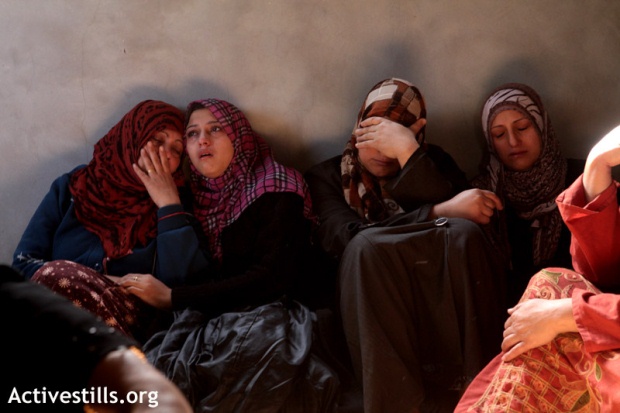
November 19
I received some shocking news; the American International School of Gaza – AISG was partially damaged as a result of an Israeli raid on a nearby police station. This is the school where I work. In the 22-day war on Gaza in 2008-2009, the school was completely destroyed, having been targeted by heavy shelling, as Israel claimed that military factions in the Gaza Strip had used it to launch their rockets. Since then, the school has been struggling to complete its educational mission. It was never re-built, due to the siege on Gaza and the difficulties of getting any construction materials into the Gaza Strip. Instead, the school’s administration rented three buildings over the past four years in order to proceed with its mission. And during this war, the mission was again interrupted, and the school attracted its share of the war machine’s destructive power. The school is just yet another addition to the many buildings already targeted and demolished in the Gaza Strip, and the death toll increasing with the careless killing of civilians, including kids. And all I could do was contact the students to try and make them feel less hopeless. That’s how the blind giants of wars all over the world are: thirsty for destruction and blood. And the price for that is the suffering of the innocents.
The war was in its sixth consecutive day. The days and nights were hardly passing. With every minute that crawled by, the situation in Gaza kept getting worse, and that feeling of security that I deluded myself and my family with was increasingly giving way to the war’s escalation. The area of the tunnels, less than half a mile away, was being heavily targeted by the fighter jets, and the balcony of the house had become a window of terror that my family and I kept running to with every explosion, to see just how close each “pillar of smoke” was.
November 20
Another unusual wake-up alarm. Heavier and more intense shelling around the tunnels during the first hours of the morning. The sounds of the explosions were deafening; the house’s shaking from the airstrikes was more terrifying and threatening than ever, and the trembling rush of adrenaline that overtook everybody was extraordinary. Gasps of shock were rapidly consuming the vulnerability of hope to survive. As my family is running around in fear, my mind is overcome again with strategic and tactical thinking. “Is this the beginning of a ground incursion? Will our house be targeted? And if not, is it going to keep my family and me safe?”
Catching a glimpse of what was happening outside through a nearby window provided an antidote to the horror. It was just a “regular” escalation of airstrikes. I went back to my room to conduct the usual web investigation of today’s situation and tomorrow’s destiny. Good news! Rumors about a ceasefire between the rivals were all over the news. But the airstrikes, shelling, and killing of civilians in Gaza continued. I stayed awake all day and the following night long, waiting for that a truce.

November 21
The news brings word of another terrible incident that occurred; an incident that seemed like it would be a negative turning point during this war. A bus was bombed in the middle of Tel Aviv. It is 12.30, and I feel numbness within me and all around me. Motionless, I lie in my bed, staring at the ceiling and thinking of the consequences of this attack in the heart of Israel. The more I thought, the more I felt the fires of the war. It was a real possibility that operation “Pillar of Defense” could now turn into into “Pillar on Ground.” The worst would happen: a war even more unimaginable in its ruthlessness and brutality. My mind overcome with exhaustion, I fall asleep, uninterested in what will happen next.
I awoke later after 10 uninterrupted hours of sleep: a piece of heaven. It was all over. Headlines all over the television and internet declared a ceasefire effective at 9:00 p.m. on November 21. No more killing, terror, suffering, mourning, or, most importantly, waiting for death. This current nightmare was finally coming to an end, with a death toll in Gaza of 160 people, 1,222 wounded. Most were kids, mothers, women, and elderly. I was happy the war was over, but still terrified of its madness and aftermath. And terrified of the times yet to come, of a crazier re-match of the rivals.

